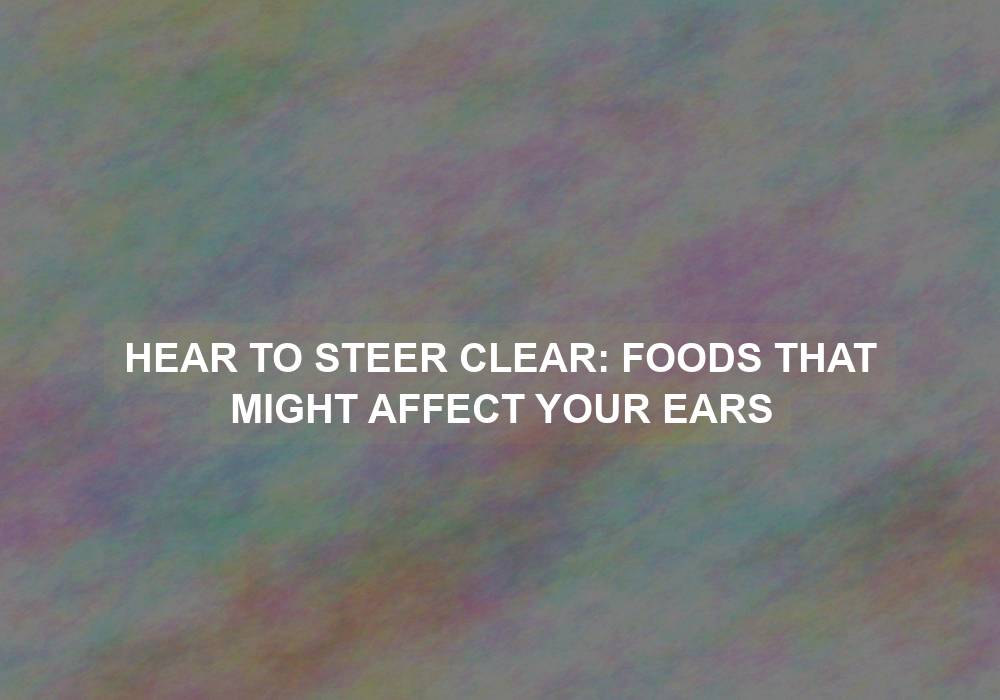When it comes to maintaining our overall health, we often tend to focus on major organs like the heart and lungs, neglecting the impact that our diet can have on our ears. However, our sense of hearing is incredibly important, and certain foods and dietary habits can either support or hinder the health of our ears. In this article, we will explore the connection between diet and ear health, and discuss some foods that might have a negative effect on your ears.
The Link Between Diet and Ear Health
Before we delve into specific foods, it is crucial to understand the profound connection between our diet and the health of our ears. Just like the rest of our body, our ears require proper nutrition to function optimally. A well-balanced diet can provide the necessary vitamins, minerals, and antioxidants that promote healthy hearing.
Conversely, an unhealthy diet can contribute to various ear-related problems. Consuming excessive amounts of sugary foods, unhealthy fats, and processed snacks can lead to inflammation, poor circulation, and a weakened immune system – all of which can negatively impact our ears.
Foods That Might Affect Your Ears
While there are numerous foods that can support ear health, it is equally important to be aware of the ones that might have a negative impact. Let’s take a closer look at some foods that you should consume in moderation or avoid altogether:
1. Salt
Excessive consumption of salty foods can lead to fluid retention and contribute to high blood pressure. High blood pressure, in turn, can impair blood flow to the ears and affect hearing. To promote ear health, it is advisable to limit your salt intake and opt for healthier alternatives such as herbs and spices to enhance the flavor of your meals. Additionally, incorporating foods rich in potassium, such as bananas and sweet potatoes, can help counterbalance the negative effects of sodium.
2. Saturated Fats
Foods high in saturated fats, such as red meat, fried foods, and full-fat dairy products, can increase inflammation in the body. Inflammation can disrupt the delicate structures of the ear and potentially lead to hearing loss or tinnitus. To support ear health, opt for lean proteins like fish and poultry, low-fat dairy options, and healthier cooking methods like grilling or baking. Additionally, incorporating omega-3 fatty acids found in fish, flaxseeds, and walnuts can have anti-inflammatory effects, benefiting both your overall health and your ears.
3. Sugar and Artificial Sweeteners
Consuming excessive amounts of sugar can lead to inflammation and negatively impact the immune system. Inflammation can affect the blood vessels in the ears, potentially leading to hearing problems. Artificial sweeteners, often found in diet sodas and processed foods, can also have a similar effect. To promote ear health, it is advisable to reduce your sugar intake and choose natural sweeteners like honey or maple syrup instead. Additionally, incorporating antioxidant-rich foods like berries, citrus fruits, and dark leafy greens can help combat inflammation and support overall ear health.
4. Caffeine
While moderate caffeine consumption is generally considered safe, excessive intake can lead to constriction of blood vessels, including those in the ears. This constriction can limit blood flow and oxygen to the auditory system, potentially affecting hearing. It is recommended to moderate your caffeine intake and choose herbal teas or decaffeinated options whenever possible. Additionally, staying adequately hydrated by consuming water and hydrating foods like watermelon and cucumbers can help maintain optimal blood flow to the ears.
5. Processed and Fast Foods
Processed and fast foods are often high in unhealthy fats, salt, and sugar, making them detrimental to overall health, including ear health. These foods not only lack essential nutrients but can also contribute to inflammation and poor circulation. To support your ears and overall well-being, prioritize whole, unprocessed foods and home-cooked meals. Incorporate a variety of fruits, vegetables, whole grains, and lean proteins into your diet to ensure you are providing your ears with the necessary nutrients for optimal health.
6. Alcohol
Excessive alcohol consumption can have various negative effects on the body, including the potential to damage the delicate hair cells in the inner ear. These hair cells are vital for converting sound vibrations into electrical signals that the brain can interpret. To protect your ears, it is advisable to consume alcohol in moderation and stay hydrated. Additionally, incorporating foods rich in antioxidants, such as green tea, berries, and dark chocolate, can help counteract the oxidative stress caused by alcohol consumption.
Conclusion
While diet alone cannot prevent all ear-related issues, it undoubtedly plays a significant role in maintaining ear health. By being mindful of the foods we consume and making healthier choices, we can support our auditory system and potentially reduce the risk of developing hearing problems. Remember, a well-balanced diet, rich in nutrients, antioxidants, and anti-inflammatory foods, can go a long way in protecting our ears and preserving our sense of hearing. So, let’s steer clear of foods that might negatively affect our ears and embrace a diet that promotes optimal ear health.
Note: This response is generated by an AI language model and edited by a human content writer to ensure fluency in English.
